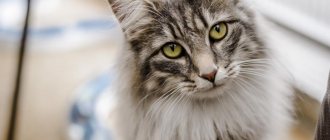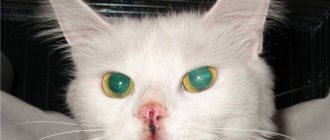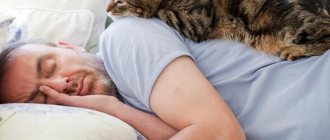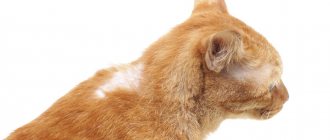Are you wondering what a cat's head mean, middle? Your cat loses her head about you, but you don't. I don't know why Cats are mysterious creatures and can be a mystery to their human companions. They tend to be very sleepy, make interesting noises and purrs, and do things that are sometimes inexplicable, like rubbing against you.
Do you want to better understand your cat? If so, you've come to the right place! A cat's behavior is often directly related to the cat's body language. For more information on cat rubbing and cat butting , continue reading here on HowMeow.
Tries to get you out of your seat
Most often this happens early in the morning, when you are still sleeping peacefully in your bed and suddenly feel the touch of a cat's paws on your face. By the way, it is no coincidence that they may seem wet to you, since cats only sweat through their paws.
Early awakening of a pet is associated with the biological clock, as well as physical activity and nutritional needs. Instill discipline in your cat by following a clear feeding schedule throughout the day.
Try to be understanding of your pet's natural nature. To do this, feed your furry friend a hearty dinner, leave food and drink bowls full in the morning, and always keep access to the litter box open.
Why does a cat overgroom itself?
Our kittens have complex brains and are very susceptible to psychological complications. Excessive grooming or biting may be a sign that they have mental issues that need to be addressed, most often related to anxiety.
Your cat may have difficulty adjusting to a new routine, a new family member, or other changes in the household. Just as humans may bite their nails or exhibit other physical signs of anxiety, cats often bite their fur. Kitties are creatures of routine. If you notice that they are over-grooming, something is probably bothering them.
Your cat may be over-grooming for medical reasons. Some of them include:
- Allergies : Seasonal or atmospheric allergies can cause skin irritation in your cat. This will cause them to itch and they will bite themselves to make it stop.
- Dry Skin : Just like humans, cats can get dry skin from dry or cold air. They may lick or bite excessively all over the body or one area that particularly bothers them.
- Parasites : Your cat's fur could be home to fleas or other parasites, and you can bet your kitty will chase them down with her teeth to try and get rid of them.
- Pain : A cat may experience pain due to injury or disorder. Their instinct will be to lick the area that hurts them.
© shutterstock
Remembers his mother
The big question is whether grown-up kittens and adult cats remember their mother. But it has been scientifically proven that the desire of a cat to stomp on your face is associated with childhood and with pleasant memories of being fed with mother's milk.
“Milk step” is a term used by veterinarians to define the behavior of a kitten when receiving food from a nursing cat. Kittens alternately press their front paws on the mother's belly, thereby stimulating milk production. The childish reflex remains in cats for the rest of their lives - it is a special form of calming, affection, showing love and trust in their owner.
Expresses his feelings
We often confuse a cat's attempts to attract our attention with hooliganism. Well, you shouldn’t take this as a manifestation of predatory instincts and a direct threat of attack. Rather, this indicates that your mustachioed friend is kindly disposed towards you and calls for reciprocal affection.
Most often this happens when we are passionate about something else. For example, a cat pokes a furry limb in your face, trying to force you to take your mind off a telephone conversation, reading your favorite book or watching a movie.
Pay attention to your pet's tail. Domestic cats show their good disposition towards their owner by raising their tail vertically upward. And if the tail and ears are pressed down, then the animal is annoyed with something and is inclined to conflict.
What to do, how to make friends with pets?
The following tricks will help you make friends with cats so that they get along calmly in the same territory:
- Separation of territory and property and isolation. At first, it is better to keep animals separately, in different rooms. If you periodically change cats' places, they will quickly get used to each other's smell. At the same time, you should not allow the new pet to use the “master’s” bowls and tray. This is how an older cat may feel a threat to its dominant position.
- Equal conditions. The arrival of a new tenant in the house should not lead to the first cat receiving less affection and attention than before. The owner should try to devote the same amount of time to the animals. At the same time, both pets should receive the same rewards and punishments for the same actions. You should not give your new ward any concessions or allow too much “while he is not yet used to it.” This will naturally cause jealousy in an old cat.
- Behavior correction. At first, you should not leave the animals alone. The owner will have to carefully monitor the pets’ attitude towards each other and, if conflicts arise, personally separate the pets, scaring them with loud bangs or spray water.
- Use of sedatives. Undesirable behavior in children can be corrected with the help of special medications. Such remedies as “Cat Bayun”, “Feliway” and “Stop-stress” will help reduce the level of aggression.
Depending on the circumstances, it can take anywhere from a few days to a year for the animals to get used to each other. What should you do if, even after this period, one cat hisses at the other, takes threatening poses and demonstrates hostility in every possible way? Unfortunately, if contact between pets has not occurred in 12 months, it will not appear in the future. In this case, the most humane solution would be to permanently resettle the animals by finding another home for one of them.
Source
Asks to play with him
Cats know how to entertain themselves and never let their owners get bored. We've all at least once experienced the thrill of a sudden landing of clawed paws from somewhere above or had to save our legs and arms from scratching attacks.
You need to play with cats if you want to create comfortable living conditions for them. Playing brings out their ancient instinct of the hunter, so try to keep your cat occupied more often during the day and evening, so as not to become an “easy prey” at night.
Spend at least 10-15 minutes playing before meals, create the illusion of hunting, train your pet's flexibility and dexterity using toys on strings and throwing balls, then you will have every chance of a restful sleep.
Wants to mark the owner as his property
Cats' paws contain glands with which mustachioed owners mark their property. By touching any surface, including the owner's face, cats leave information marks and increase their level of comfort in their habitat, that is, throughout your home.
All of the above suggests that cat paws perform many important functions. With the help of their paws, cats communicate, mark their territory, groom themselves, defend themselves, calm down, and safely jump from heights.
An attentive and caring owner learns to understand his animal. If you manage to establish a tender and trusting relationship, then your mustachioed friend will give you a lot of unforgettable moments and fill your life with grateful tenderness.
3 comments
Ilya November 3, 2021 at 8:49 am
Touches often, not only on the face. The reasons are different, sometimes it’s difficult to understand
Source
How to help your baby and protect him from a cat?
As a rule, educational bites and blows, no matter how harsh they may seem from the outside, do not cause any harm to the kittens. You can easily verify this:
- there are no traces of teeth and claws on the baby’s skin;
- as soon as the baby begins to squeak, signaling that he has learned his lesson, the mother immediately lets him go;
- in addition to “aggression”, the cat also shows tenderness towards the cubs - licks them, caresses them, etc.
In the described case, the young animals do not need the protection or help of the owner. This is a normal relationship between parent and offspring. However, what to do if a cat bites kittens until they bleed, constantly hisses at them and shows no concern at all? This behavior occurs for several reasons:
- Foreign odors. Cats recognize each other through their sense of smell. If the babies smell of something new and unusual, the mother may mistake them for strangers.
- Defectiveness of the offspring. In the wild, animals prefer not to waste their own body’s resources by raising and feeding weak and sick young. In the worst case, the cat will generally eat the most unadapted, from its point of view, babies. At best, he will simply stop feeding them. Then hissing and biting will become the most convenient tool for the animal to keep the kittens away from the chest.
- Lack of milk. If a cat does not feed any of her litter at all, perhaps she simply does not have the physiological ability to do so. The veterinarian must determine whether this is due to illness or hormonal imbalance. One way or another, the cubs, unsuccessfully trying to achieve feeding, tug at the female’s nipples too persistently, causing her pain and provoking retaliatory aggressive behavior.
- Kittens growing up. By the time the babies grow up and become independent, their mother’s milk will disappear, which will cause the problems already described. In addition, having entered adulthood, the young begin to compete with the parent for territory, food, attention of the owners, etc. In this case, fights become a common way for animals to determine their place in the hierarchy.
What should owners do if their cat bites their kittens clearly not for educational purposes? First you need to try to establish the reason for this behavior. If the kittens are small, animal psychologists recommend stopping interfering in the process of raising them: do not touch the babies with your hands, “endowing” them with extraneous odors, and allow the female to build a “nest” for the offspring in a place convenient for her. However, when it comes to teenagers, there is usually no choice but to rehome the animals. The young animals are immediately transferred to artificial feeding and given to other owners as soon as possible.
Why do cats hit you with their paws?
There are many reasons why a cat might hit you with its paw. However, one of the most common times this can happen is when you pet him.
When your kitten paws, it means he doesn't know how to react. Our kittens love attention, but at the same time they are afraid of it. Most kittens love affection, especially at first. Once they feel like it's taking too long, they eventually try to escape by scratching or hitting.
But don't worry. If you think your pet hits you because he wants to hurt you, that's not true. Our felines have no intention of harming us. It is simply their reaction to the emotions they are experiencing. If your pet hits you while petting, release him and let him walk away. He will return to you as soon as he demands your attention again.
The cat hits me on the head
Is that your kitty head ? In newborn cats, the sense of smell develops much earlier than vision. This means that they use their nose from a young age to find their mother for food, care and protection. As cats get older, they continue this habit, rubbing and head-butting to greet, order food, protect and communicate...
when cats bump into each other It is not a sign of affection or love, but trust and kindness. Therefore, you may also notice that your cat will hit other pets, such as dogs, on the head.
your cat rub his nose ? Now you know why, they trust you! For more information, check out our article where we answer the question..., ''How do cats communicate??''
Why does my cat spank me with its paw?
By nature, felines are prone to overstimulation. This may be the reason why your cat is hitting you with its paws. At the same time, your pet still requires more of your attention and care.
If you pet your kitten when he hits you, it may mean that your pet wants you to stop. At the same time, your kitten may want to say that he doesn't like your petting.
However, if you are already familiar with your kitten and know how to pet him, you may be wondering why he is suddenly hitting you. In such cases, your pet may get injured or something similar.
If you think there is something wrong with your pet, it is best to contact your veterinarian for advice.
Why does a cat start to hiss at her kitten, bite him and hit him with her paws?
In the wild, all animals are divided into 2 types. Some are born almost completely adapted to independent life (for example, a small foal just a couple of hours after birth walks quite confidently and nibbles grass). Others are completely helpless and need parental protection and training.
Cats belong to the second type, and unlike, for example, people who take years to acquire new skills, they have much less time. How can an animal teach a child to behave correctly with relatives, to hunt and hide in the shortest possible time? Instinct tells the cat that the easiest way to do this is to use the pain of a bite on the neck or a slap with a paw as a tool to reinforce the learned material.
Why does a cat hit his face with his paw?
If a cat hits you in the face, it does not mean that your pet wants to harm you.
Again, as I said earlier, felines mean no harm, especially to their owners.
If the kitten touches your face, it means it is too close to you and you are petting it.
At the same time, you may be sleeping and the cat suddenly hits you in the face.
If you pet your kitten, it could mean he needs more attention, or it could just be your kitten's way of playing.
On the other hand, if you are sleeping and your pet hits you in the face with its paw, it could mean that it is asking for food.
Whatever the reason, try to respond as gently as possible.
Sometimes such an act can be surprising. You may end up hitting your kitten (like I did). In any case, try to be gentle and not harm your pet.
© shutterstock
Options for responding to Skodas
- Replace a bad habit with an alternative one. For example, if a cat is scratching the sofa, then place one or several different scratching posts nearby and systematically accustom the animal to them.
- If an animal does something bad, then you need to switch its attention or adhere to methodical training in correct behavior. For example, if a cat meows at night and wants to play, then you should play with it during the day for several days and wait a couple of nights without responding to its calls.
- It is important to understand the reason for the bad behavior and provide the cat with what it needs or correct the behavior using positive methods (a huge number of them have been described and tested by specialists).
- Contactless fight. For example, tape glued to the corner of the door, which the cat scratches. Or you can use cans to make a table that the cat is not allowed to jump on. Over time, the bad habit will be forgotten. And it will be possible to remove foreign objects.
- Teach your cat the “No” command, spoken in a calm but insistent tone. Again, it is necessary to train without aversive methods.
- Some cats really behave intolerably. But this rather indicates psychological problems, such as anxiety. Articles on animal psychology and specialists working on positive reinforcement will help solve such problems.
- You shouldn’t accumulate emotions in yourself until the slightest little thing enrages you and leads you to uncontrollable rage. If the cat gets bored, then you need to find a way to release emotions. For example, run, scream into a pillow, leave the room for a while, make yourself a soothing tea, and so on.
Why do cats paw?
Cats use their paws for many reasons, and one of them is to express what they want. The main reasons why kittens paw are as follows:
- He's looking for attention
If you get busy and after a while your pet ends up hitting you when you walk by, he may be looking for attention.
Cats love attention and are ready for anything. These felines even consider screaming a sign of attention.
For this reason, you should spend some time playing with your pet.
- The cat is hungry
Alternatives to Physical Punishment
Behavioral psychologists offer four options for correcting behavior in both humans and animals. They can be used once other causes of bad behavior have been eliminated. That is, the cat is healthy mentally and physically, it has all the necessary resources, it feels safe. Behavior correction methods:
- Positive punishment is introducing something that the cat does not like. For example, splash water while the cat begins to chew a flower. But this method is considered the most ineffective. Animal psychologists do not recommend doing this. It is better to spray the same flower with a repellent citrus aromatic oil or bitter spray;
- Negative punishment is taking away something nice from a cat when she does something out of the ordinary. For example, if a kitten bites your hands, then simply play with your hands, offer other toys and stop playing every time he bites;
- Positive reinforcement is giving your cat something she likes. For example, a treat if she did the right thing;
- Negative reinforcement is the removal of an unpleasant stimulus. For example, open the door to the room from the corridor where the cat was isolated for the night if it has stopped meowing and is ready to sleep.
Research has shown that combining positive incentives with negative punishment produces good results. And there is no need to use physical force - the animal itself will understand what they want from it.
If a person breaks down in impotent anger at his pet, then it is better to give it into good hands or ask for help from a psychologist. Learning to control anger is not a shame. If the restless and harmful cat itself leads to impotence through its actions, then animal psychologists and articles on animal psychology come to the rescue. All behavior problems can be solved, and reinforcement can achieve more than punishment, although it requires more patience. But it's worth it!
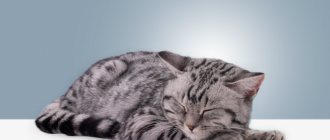
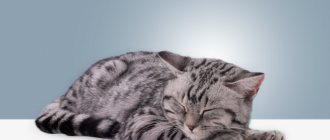
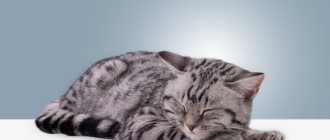
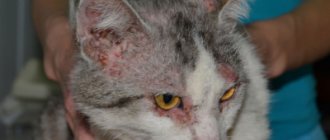
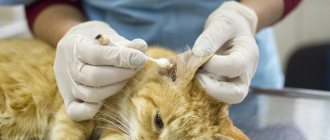
![Why is the cat drooling: [Find out the reason, What to do]](https://koriiza.ru/wp-content/uploads/pochemu-u-kota-tekut-slyuni-uznajte-prichinu-chto-delat-330x140.jpg)
